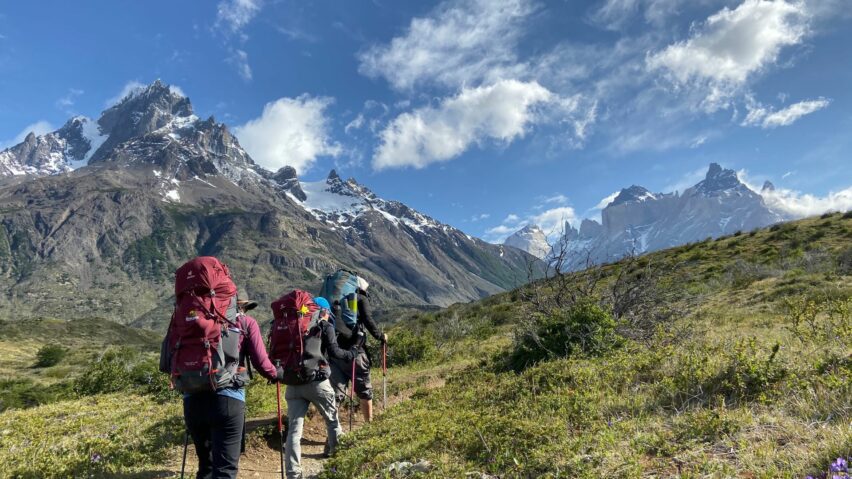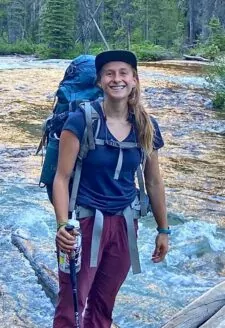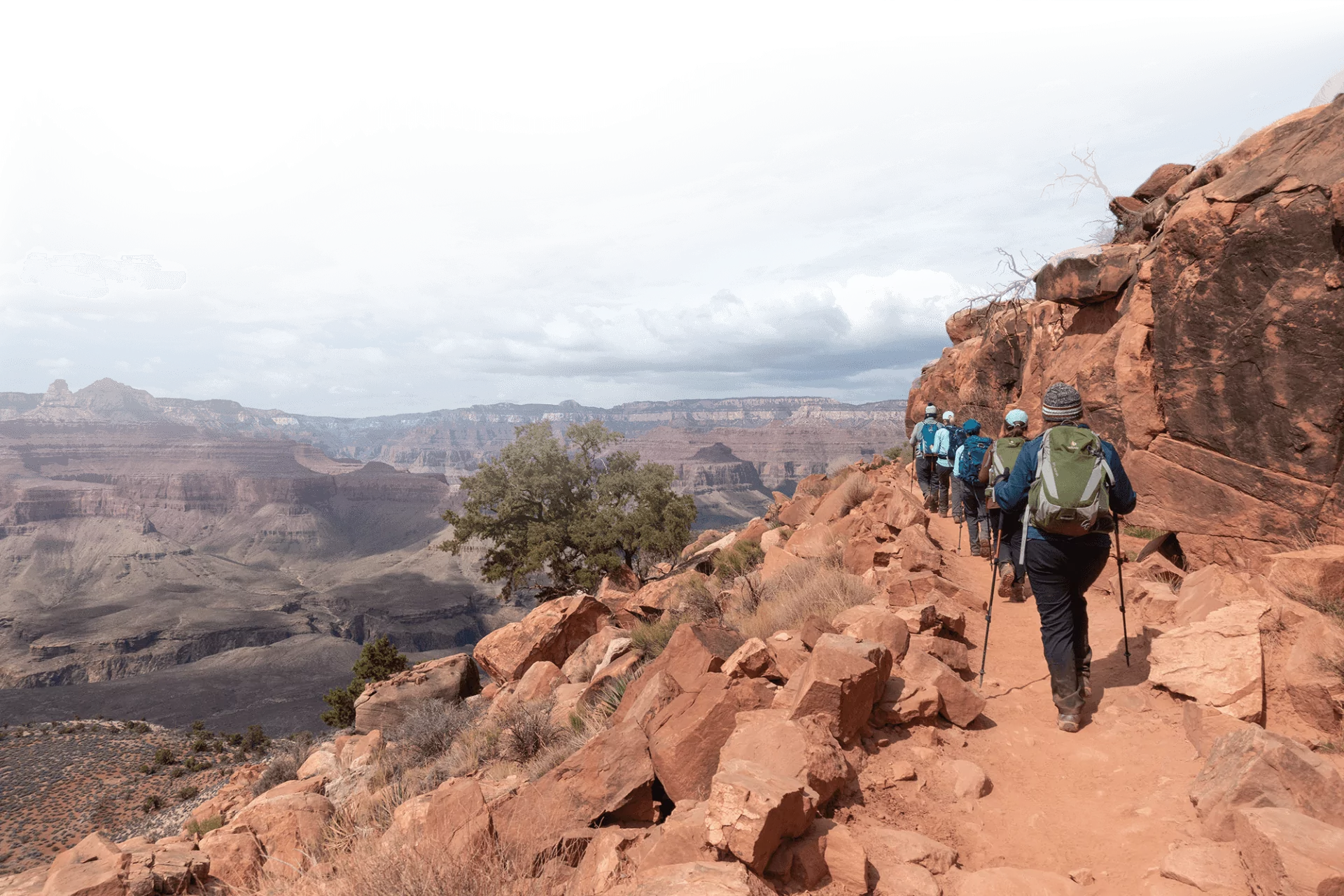Sustainability in the Tourism Industry
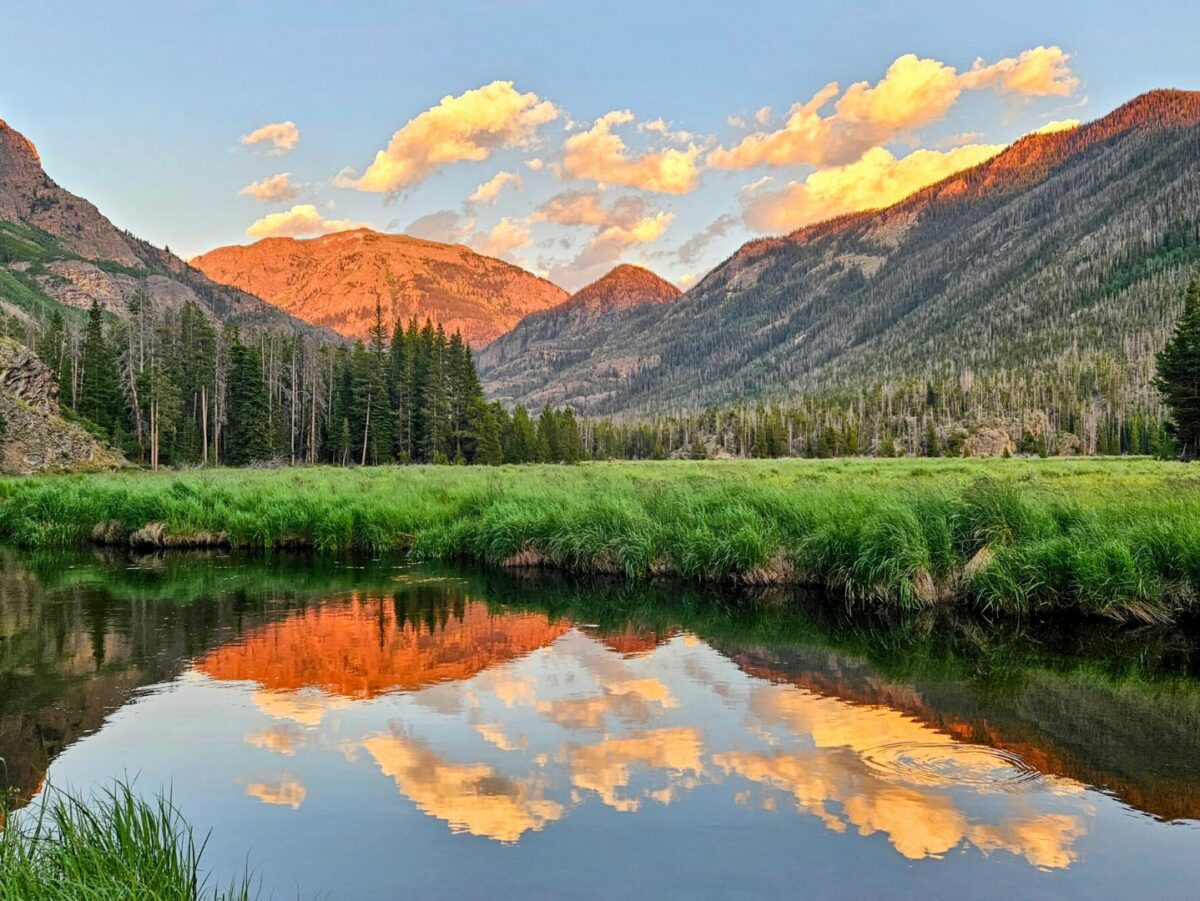
At Wildland Trekking we know that travel, and hiking vacations in particular, can change our guests’ lives. Not only are we getting great exercise, we’re reconnecting with nature, meeting new people, and creating a space to reflect. Hiking vacations encourage a minimalist approach to living, helping us realize how little we really need to be happy. They push us outside of our comfort zones, teaching us that we’re capable of enduring more than we might think. They help us process anxiety, grief, and trauma to become more resilient.
In an increasingly globalized world, experiencing other cultures can teach you ways to contribute to your own society. Studies have shown that traveling makes people healthier, more creative and imaginative, and can effectively reduce stress and depression. These effects are so well known that Canadian doctors have even begun prescribing time in Canada’s National Parks! As the travel industry grows, it is increasingly important to consider the impacts of traveling on the special places that we know and love.
Changing the way we view travel
 Let’s start big, with our planet: overall, tourism contributes around 10% of the world’s greenhouse gas emissions. When looking at a breakdown of individual trips to see where these emissions are coming from, transportation accounts for almost half (49%) of the tourism industry’s carbon footprint. Air travel is the main culprit of this staggering statistic, although traveling by car can be quite inefficient too if we’re talking about a single-person in a large vehicle.
Let’s start big, with our planet: overall, tourism contributes around 10% of the world’s greenhouse gas emissions. When looking at a breakdown of individual trips to see where these emissions are coming from, transportation accounts for almost half (49%) of the tourism industry’s carbon footprint. Air travel is the main culprit of this staggering statistic, although traveling by car can be quite inefficient too if we’re talking about a single-person in a large vehicle. 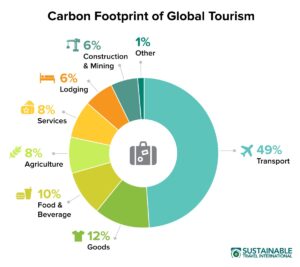
Other activities that contribute to tourism’s footprint include shopping, food and beverage consumption, services, and lodging. The data show that these combine to contribute almost equally as much as transportation, so it makes sense to prioritize eco-friendly transit for the biggest carbon-saving impact. That would include opting for public transit, carpooling, or using fuel-efficient vehicles.
At Wildland Trekking, we prefer activities that aren’t centered around motorized transit – hiking, camping, and backpacking, but we understand that our guests’ travel to and from each of our trips has an impact. At the administrative level, Wildland Trekking recently partnered with Tomorrow’s Air, an organization that aids travelers in being climate conscious by promoting clean air and lower carbon emissions.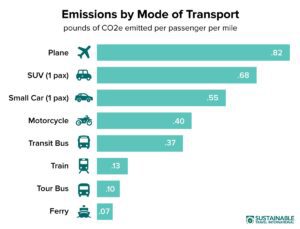
For example they help promote environmentally friendly options for transportation and lodging. They are also investing in research into cleaner fuel for airplanes and indirect air capture, a newer technology for removing greenhouse gasses from the air. Along with Tomorrow’s Air, Wildland Trekking has pledged to remove one ton of carbon dioxide from the atmosphere.
How Climate change affects travel
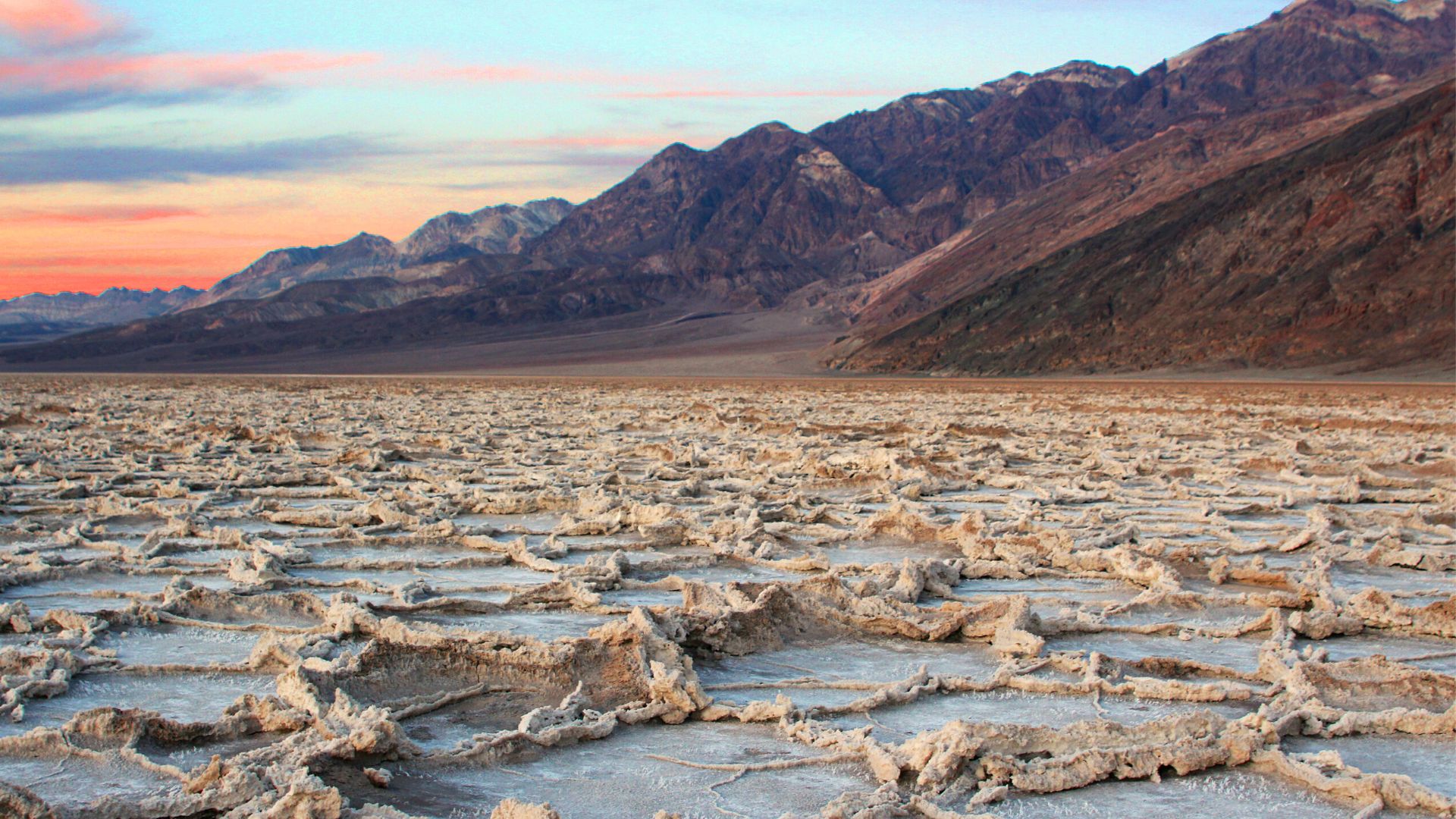 The hiking tourism industry is quite vulnerable to changes to the environment from greenhouse gas emissions. With climate change comes high unpredictability in weather, as well as more extreme weather events. As a hiking and backpacking guide, I increasingly see these changes in the areas that I know and love.
The hiking tourism industry is quite vulnerable to changes to the environment from greenhouse gas emissions. With climate change comes high unpredictability in weather, as well as more extreme weather events. As a hiking and backpacking guide, I increasingly see these changes in the areas that I know and love.
For example, heat waves in the state of Washington have caused its 4 largest wildfires in history to all occur within the last 8 years. Aside from property and forestry damage, fires also affect air quality, causing further difficulty across the entire region. This has contributed to numerous reroutes and cancellations in our Pacific Northwest branch due to trail closures, especially in North Cascades National Park.
Other Wildland operating areas have seen unprecedented flooding. For example, Death Valley National Park has experienced countless road closures both this and last year because of extreme water damage to the roads; the desert landscape is unable to accommodate the excessive amounts of rain, as the water cannot drain through the soil. Yellowstone National Park also saw extreme flooding last year, causing the North entrance of the park to be closed for the season. The list goes on – all of our operating areas have seen an increase in extreme weather events, and this can greatly affect our trips, from having to change start times, to having to reroute or, in some cases, cancel them entirely.
Thus, it’s in our best interest – as a company, as guides, and as people who enjoy outdoor recreation, to do what we can to practice and promote sustainability in the tourism industry. The United Nations Brundtland Commission, first tasked with defining sustainability in the 80s, described it as “meeting the needs of the present without compromising the ability of future generations to meet their own needs.” Sustainability will allow us to keep using and in some cases further protecting the land, ensuring that they will still be there for the benefit of future visitors.
What is Wildland Doing to Promote Sustainability?
To start, the Wildland mission is:
“To be a global leader in the adventure travel industry by providing exceptional hiking adventures, in a responsibly sustainable way, which promotes the conservation of both natural and human communities.”
To promote our mission, we have donated $358,114 as of March 2023 to nonprofits committed to environmental and social causes. These range from nature conservancies to educational groups and inclusivity programs. Examples include the Leave No Trace Center for Outdoor Ethics, an educational organization helping set research-based best practices in natural resource protection, as well as nonprofit partners of the National Parks we operate in, such as the Grand Canyon Conservancy.
These donations also go to hiking affinity groups for those traditionally underrepresented in outdoor recreation, such as Black Men Hike, a nonprofit providing a space to promote physical and mental health for Black Men through hiking. The full list of organizations that we support can be found here. As a guide, I’m happy to know that a portion of our company’s proceeds go back into not only preserving our special destinations in the natural world, but also to promoting greater access and equity in the outdoor industry.
To educate our guests, and also our employees, we teach and practice the 7 Leave No Trace principles: plan ahead and prepare, travel and camp on durable surfaces, dispose of waste properly, leave what you find, minimize campfire impacts, respect wildlife, and be considerate of other visitors. These give us clear and detailed guidelines to minimize the environmental impact of our trips.
We have internal Leave No Trace trainer courses, which allow our employees to collaborate on integrating the practice and teaching of LNT principles into our trips. I took the course this year and have found it an amazing structure for not only communicating “do’s” and “don’ts” to our guests, but also the “why’s.” For example, when there’s a fire ban, we are able to better explain the risk a human-caused wildfire could cause to the ecosystem and local communities.
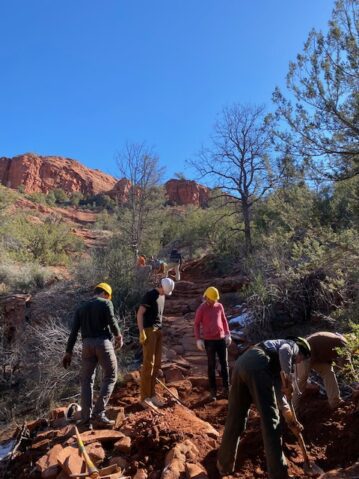
At Wildland warehouses we strive to reduce our usage of single-use plastic products by using reusable plates, bowls, cups, and cutlery in all of our operations; we even reuse our Ziploc bags. We also place an emphasis on giving gear a second life when it’s no longer up to our high standards by donating still-usable gear to organizations such as Grand Canyon Youth.
When not out on trips, Wildland employees have opportunities for paid volunteer service in our operating areas. Employees often opt to help maintain and develop trails in our local and national parks during their volunteer time. It’s great that we can give back to the areas in which we recreate, by learning to appreciate the hard work of building and maintaining trails.
We also purchase carbon offsets, which fund projects to lower greenhouse gas emissions to offset our own consumption. These projects commonly include wetland conservation and reforestation. In 2022, Wildland purchased offsets for all of our estimated greenhouse gas emissions, and will do so again for 2023.
To acknowledge our current sustainability, and to have a formalized process around continued improvements, Wildland Trekking is going through the process of becoming a certified B corporation in 2024. B Corporation – where the “B” stands for “benefit” – is a certification status for for-profit enterprises that ensures that they meet high standards in environmental and socially-ethical practices. Companies meeting these standards holistically exemplify trustworthiness and inclusivity, treat their employees fairly, are charitable, transparent, and accountable to their stakeholders.
In documenting our adherence to these ideals we are reaffirming that our current business practices and future trajectory continue to meet the mission statement we’ve had from day one, valuing the environment and each other. After all it is a love of people, nature, and of course hiking, that has brought us all together.



